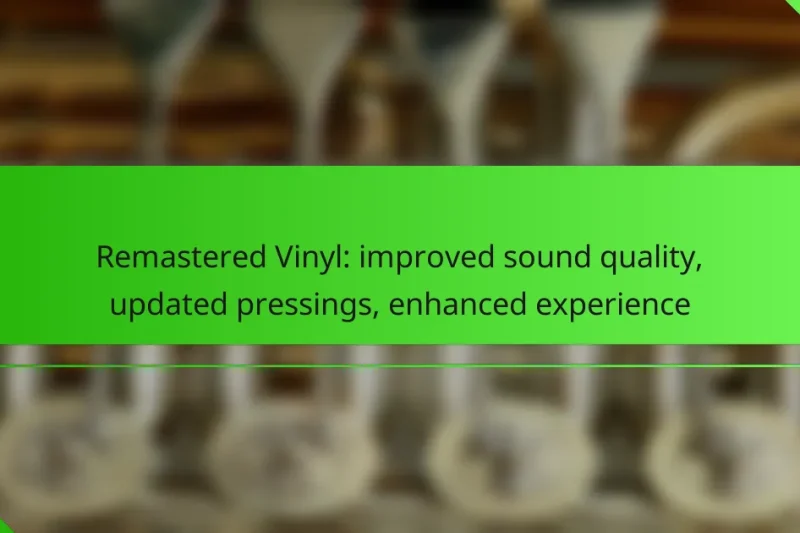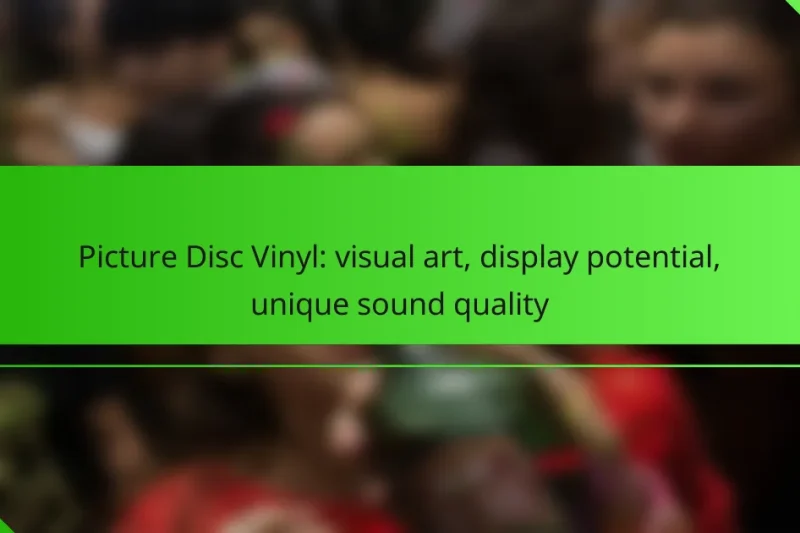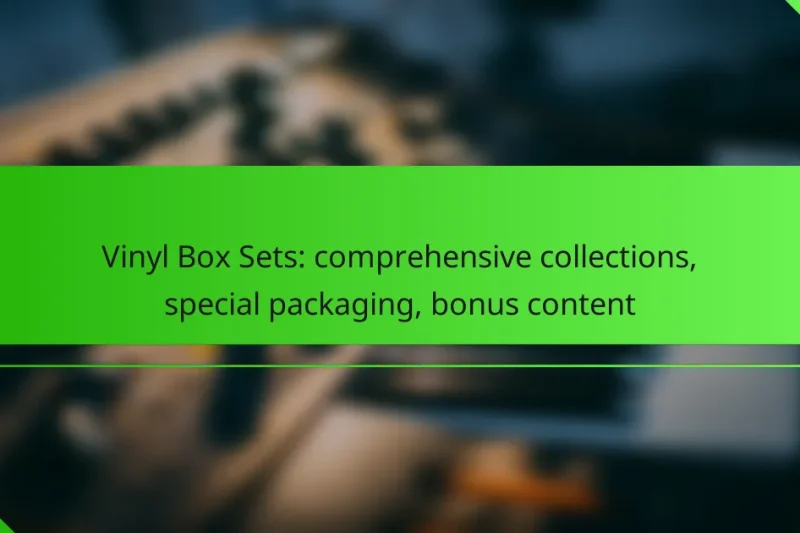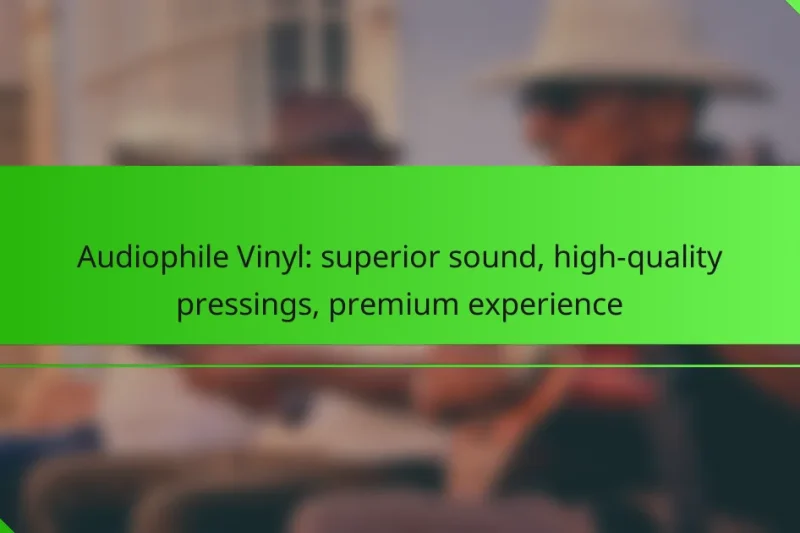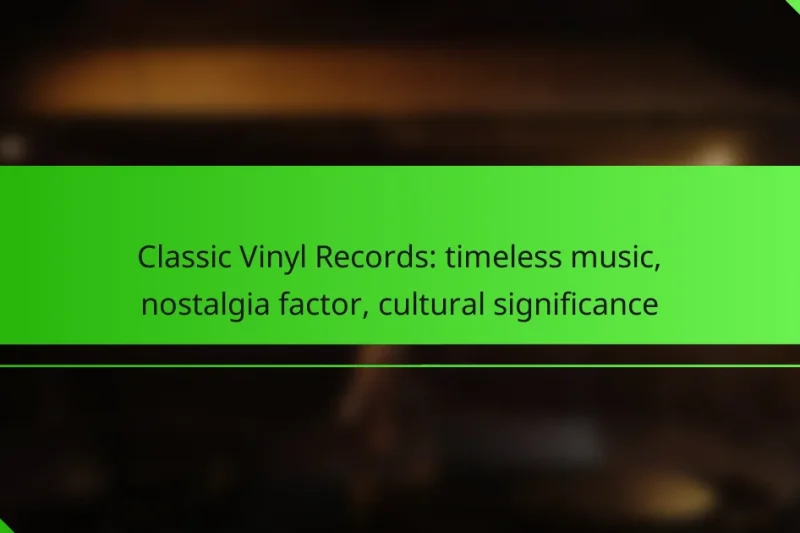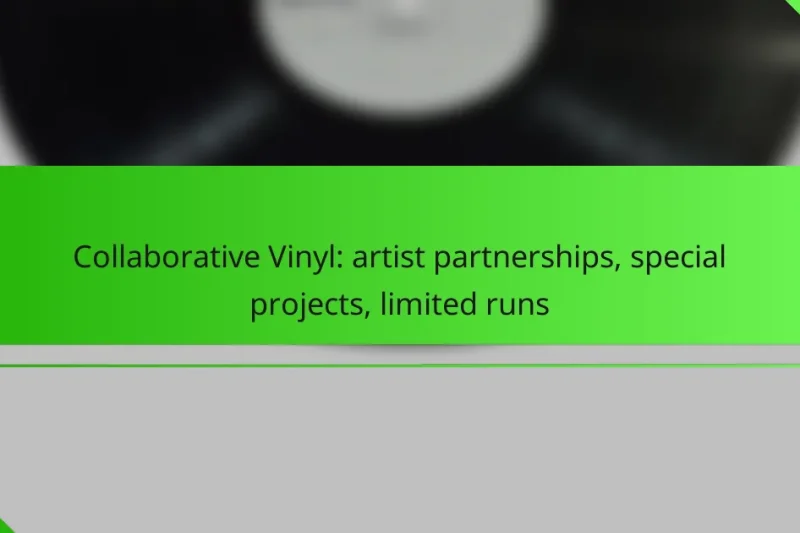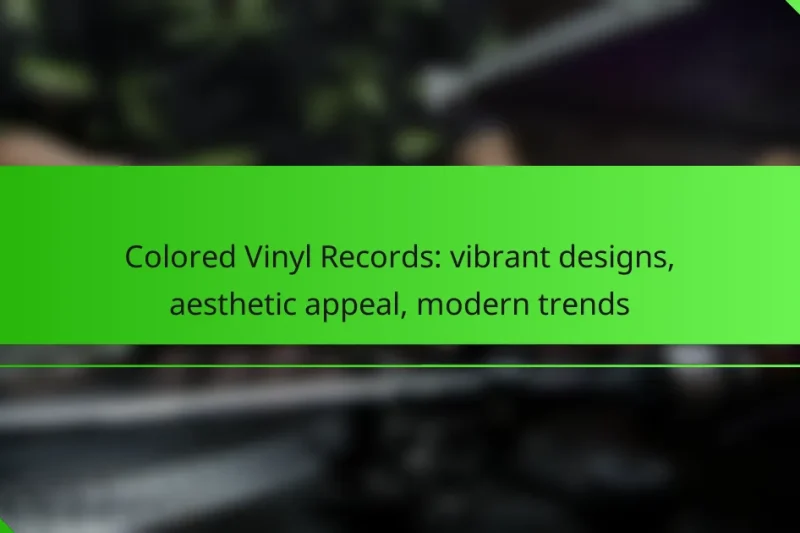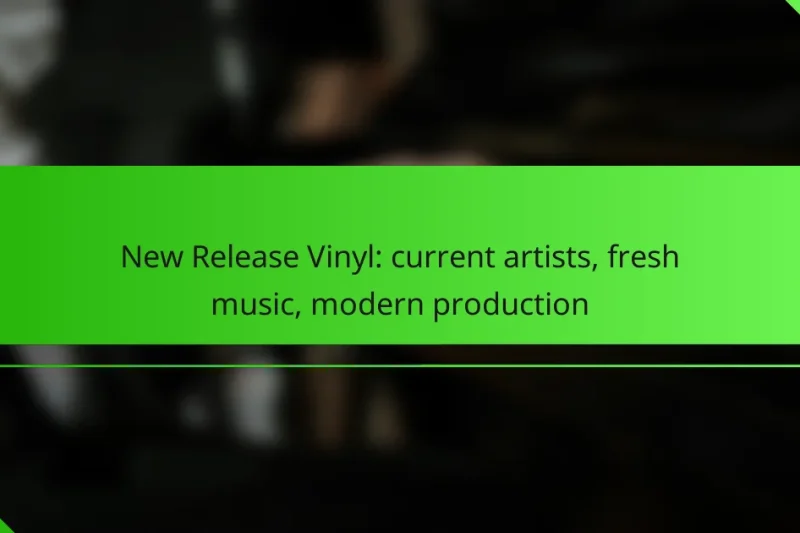Live concert vinyl offers music enthusiasts a chance to experience exclusive recordings and unique performances that … Live Concert Vinyl: exclusive recordings, unique performances, fan favoritesRead more
Reasons to Start Collecting Vinyl Records
Collecting vinyl records is a rewarding hobby that combines nostalgia with a rich auditory experience. It not only allows you to enjoy music in a tangible format but also supports local artists and fosters a sense of community among enthusiasts. With the right equipment and a passion for music, starting your collection can lead to emotional connections and even potential financial returns.
Remastered Vinyl: improved sound quality, updated pressings, enhanced experience
Remastered vinyl brings a new level of sound quality to music enthusiasts by leveraging advanced audio … Remastered Vinyl: improved sound quality, updated pressings, enhanced experienceRead more
Picture Disc Vinyl: visual art, display potential, unique sound quality
Picture disc vinyl uniquely blends visual art with music, creating a captivating experience for collectors and … Picture Disc Vinyl: visual art, display potential, unique sound qualityRead more
Vinyl Box Sets: comprehensive collections, special packaging, bonus content
Vinyl box sets are a treasure trove for collectors and music lovers, offering comprehensive collections that … Vinyl Box Sets: comprehensive collections, special packaging, bonus contentRead more
Audiophile Vinyl: superior sound, high-quality pressings, premium experience
Audiophile vinyl offers a superior sound experience through meticulous production standards and high-quality materials, ensuring that … Audiophile Vinyl: superior sound, high-quality pressings, premium experienceRead more
Soundtrack Vinyl: cinematic experience, iconic scores, collectible editions
Soundtrack vinyl offers a unique way to experience iconic film scores that have shaped cinematic history. … Soundtrack Vinyl: cinematic experience, iconic scores, collectible editionsRead more
Classic Vinyl Records: timeless music, nostalgia factor, cultural significance
Classic vinyl records hold a special place in the hearts of music lovers, offering not only … Classic Vinyl Records: timeless music, nostalgia factor, cultural significanceRead more
Collaborative Vinyl: artist partnerships, special projects, limited runs
Collaborative vinyl projects in Australia showcase the dynamic partnerships between artists and labels, resulting in exclusive … Collaborative Vinyl: artist partnerships, special projects, limited runsRead more
Colored Vinyl Records: vibrant designs, aesthetic appeal, modern trends
Colored vinyl records have surged in popularity, captivating collectors and music enthusiasts alike with their vibrant … Colored Vinyl Records: vibrant designs, aesthetic appeal, modern trendsRead more
New Release Vinyl: current artists, fresh music, modern production
New release vinyl is experiencing a surge in popularity in Australia, captivating music lovers with fresh … New Release Vinyl: current artists, fresh music, modern productionRead more
Why should you start collecting vinyl records in Australia?
Collecting vinyl records in Australia offers a unique blend of nostalgia, sound quality, and cultural engagement. It allows enthusiasts to enjoy music in a tangible format while supporting local artists and the music community.
Unique sound quality
Vinyl records provide a distinct sound quality that many audiophiles appreciate. The analog nature of vinyl captures a warmth and depth that digital formats often lack. This richness in sound can enhance the listening experience, making it feel more immersive.
When collecting, consider investing in a good turntable and speakers to fully appreciate the nuances of vinyl. Many collectors find that certain genres, like jazz or classical, sound particularly exceptional on vinyl due to their dynamic range.
Physical ownership experience
Owning vinyl records offers a physical connection to music that digital formats cannot replicate. The large album artwork and tactile experience of handling records create a more engaging way to enjoy music. Collectors often take pride in displaying their collections, turning them into a personal art form.
When starting your collection, look for albums that resonate with you personally, whether they are classics or contemporary releases. This personal touch can make the collecting experience more meaningful and enjoyable.
Support for local artists
Collecting vinyl records can significantly contribute to the local music scene in Australia. Purchasing records from local artists helps sustain their careers and promotes homegrown talent. Many independent record stores also feature local musicians, providing a platform for their work.
Consider attending local record fairs or music festivals to discover new artists and expand your collection. Engaging with the community not only supports artists but also enriches your own musical journey.
What are the benefits of vinyl record collecting?
Collecting vinyl records offers numerous advantages, including potential financial returns, emotional connections, and opportunities for social interaction. Enthusiasts often find joy in the tactile experience of handling records and the unique sound quality they provide.
Investment potential
Vinyl records can serve as a viable investment, with certain albums appreciating significantly over time. Rare editions or albums from iconic artists may sell for hundreds or even thousands of dollars, making them attractive to collectors and investors alike.
To maximize investment potential, focus on limited releases, first pressings, and albums in excellent condition. Regularly check market trends and auction sites to gauge the value of your collection and identify potential acquisitions.
Nostalgic value
Many collectors are drawn to vinyl records due to their nostalgic appeal. The physical format evokes memories of past eras, allowing listeners to connect with music in a more intimate way than digital formats.
Listening to vinyl can transport you back to specific moments in time, enhancing the overall experience. This emotional connection often leads collectors to seek out albums that hold personal significance or represent their favorite musical periods.
Community engagement
Joining the vinyl collecting community can provide a sense of belonging and shared passion. Many collectors participate in local record fairs, online forums, and social media groups, where they can exchange tips, trade records, and discuss their favorite finds.
Engaging with fellow enthusiasts can lead to valuable connections and opportunities to discover rare items. Consider attending events or joining clubs to deepen your involvement and enhance your collecting experience.
How to begin your vinyl record collection?
Starting a vinyl record collection involves selecting the right equipment and sourcing records that interest you. Focus on choosing a quality turntable, exploring local record shops, and beginning with albums that resonate with your musical taste.
Choosing a turntable
When selecting a turntable, consider factors such as sound quality, build, and features. Look for models that offer adjustable speed settings (33 1/3 and 45 RPM) and a good cartridge for optimal sound reproduction.
Entry-level turntables typically range from $100 to $300, while higher-end models can exceed $1,000. Brands like Audio-Technica, Pro-Ject, and Rega are popular choices among collectors.
Finding local record stores
Local record stores are treasure troves for vinyl enthusiasts. Start by searching online directories or social media groups dedicated to vinyl collecting in your area.
Visiting these stores allows you to browse a variety of genres and discover hidden gems. Don’t hesitate to ask staff for recommendations or join in-store events to connect with other collectors.
Starting with popular albums
To build a solid foundation for your collection, begin with classic albums that have stood the test of time. Iconic records from artists like The Beatles, Fleetwood Mac, and David Bowie are great starting points.
Consider purchasing both new reissues and used records to diversify your collection. New vinyl can range from $20 to $40, while used records may vary widely in price depending on condition and rarity.
What are the best vinyl records to collect?
The best vinyl records to collect often include classic rock albums, jazz masterpieces, and modern indie releases. These categories not only showcase a range of musical styles but also tend to hold their value over time, making them appealing to both new and seasoned collectors.
Classic rock albums
Classic rock albums are a staple for any vinyl collection, featuring iconic artists such as The Beatles, Led Zeppelin, and Pink Floyd. These records often have a significant cultural impact and are frequently sought after for their timeless sound and artwork.
When collecting classic rock, focus on first pressings and limited editions, as these tend to appreciate in value. Look for albums in good condition, ideally graded as Very Good (VG) or better, to ensure a quality listening experience.
Jazz masterpieces
Jazz masterpieces are essential for collectors who appreciate improvisation and musical complexity. Albums by legends like Miles Davis, John Coltrane, and Ella Fitzgerald are highly regarded and often feature unique cover art that adds to their collectible nature.
Consider collecting original pressings from labels like Blue Note or Verve, as these are often more valuable. Pay attention to the condition of the vinyl and the sleeve, as both can significantly affect the album’s worth.
Modern indie releases
Modern indie releases have gained popularity in recent years, with many artists opting to produce vinyl versions of their music. Labels such as Sub Pop and Matador frequently release limited editions that can become collector’s items.
When exploring modern indie records, keep an eye out for colored vinyl or special packaging, as these features can enhance their appeal. Engaging with local record stores and online communities can also help you discover hidden gems in this evolving genre.
How to care for your vinyl records?
Caring for your vinyl records is essential to maintain their sound quality and longevity. Proper care involves cleaning, storing, and maintaining your records to prevent damage and ensure optimal playback.
Cleaning techniques
Regular cleaning is crucial for preserving the sound quality of your vinyl records. Use a carbon fiber brush to remove dust and debris before each play. For deeper cleaning, consider using a record cleaning solution and a microfiber cloth or a dedicated record cleaning machine.
Avoid using household cleaners, as they can leave residues or damage the vinyl. Instead, opt for products specifically designed for vinyl care, which are often alcohol-free and safe for your records.
Proper storage methods
Store your vinyl records vertically to prevent warping and damage. Use sturdy shelves or record crates that can support the weight of your collection. Ensure that the environment is cool and dry, ideally between 18°C and 22°C, to minimize the risk of warping or mold.
Keep records away from direct sunlight and extreme temperatures, as these conditions can degrade the vinyl. Use protective inner sleeves made of anti-static material to shield your records from dust and scratches.
Maintenance tips
Inspect your records regularly for scratches or signs of wear. If you notice any issues, address them promptly to avoid further damage. Additionally, clean your turntable’s needle regularly to ensure optimal playback quality.
Consider investing in a humidity and temperature monitor for your storage area. Maintaining stable conditions can significantly extend the life of your vinyl records. Avoid touching the grooves of the records to prevent oils from your fingers from affecting playback quality.
What are the common mistakes in vinyl collecting?
Common mistakes in vinyl collecting include overlooking the condition of records and overpaying for items that may not hold their value. Being aware of these pitfalls can help collectors make informed decisions and build a valuable collection.
Ignoring condition ratings
Condition ratings are crucial in vinyl collecting as they significantly affect a record’s value and playability. Ratings typically range from Mint (M) to Poor (P), with several grades in between, such as Near Mint (NM) and Very Good (VG). Always check the grading before purchasing to avoid acquiring records that may not meet your expectations.
When assessing condition, consider factors like surface scratches, warping, and label wear. A record graded as VG may still play well, but it might not be suitable for audiophiles seeking pristine sound quality. Use a reliable grading guide to help you evaluate records accurately.
Overpaying for records
Overpaying for vinyl records is a common mistake that can diminish the enjoyment of collecting. Prices can vary widely based on rarity, demand, and condition, so it’s essential to research before making a purchase. Websites like Discogs or eBay can provide insights into fair market values.
To avoid overpaying, set a budget and stick to it. Consider attending local record fairs or shops where you can negotiate prices. Additionally, be cautious of hype around certain records; just because a record is popular does not mean it is worth a premium price.

